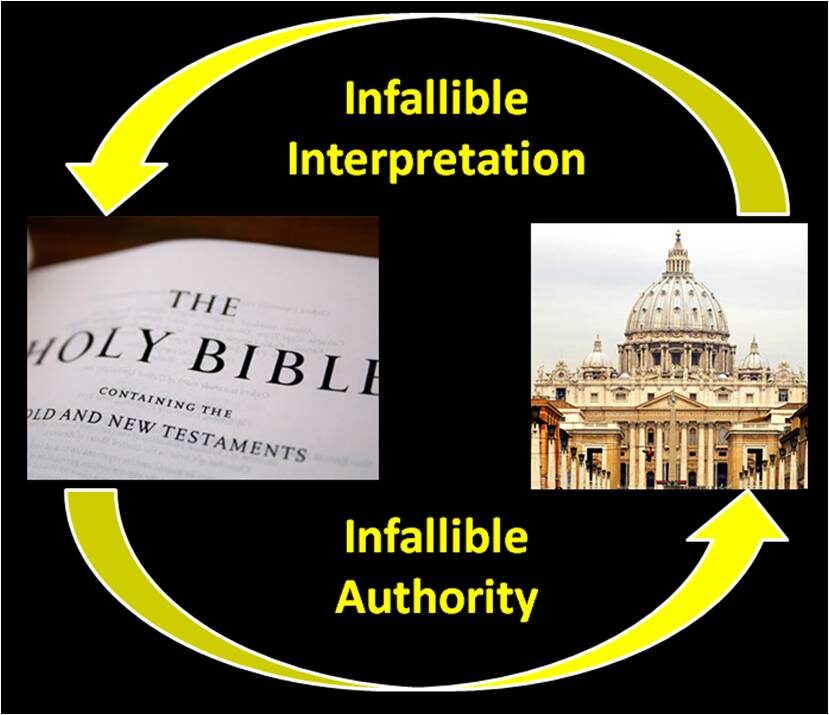A point of contention between Roman Catholicism and Protestantism is whether the text of the Bible alone (sola scriptura), or the text of the Bible, tradition and the ruling of the councils and declarations of the Popes (sola ecclesia), are the sole infallible rule of faith.
Roman Catholicism, in part, explains it this way in the Catechism of the Catholic Church #95:
…in the supremely wise arrangement of God, sacred Tradition, Sacred Scripture, and the Magisterium of the Church are so connected and associated that one of them cannot stand without the others. Working together, each in its own way, under the action of the one Holy Spirit, they all contribute effectively to the salvation of souls.
The Bible certainly seems to teach that the text of scripture and tradition are equally valid:
…we are bound to give thanks to God always for you, brethren beloved by the Lord, because God from the beginning chose you for salvation through sanctification by the Spirit and belief in the truth, to which He called you by our gospel, for the obtaining of the glory of our Lord Jesus Christ. Therefore, brethren, stand fast and hold the traditions which you were taught, whether by word or our epistle (2nd Thessalonians 2:13-15).
Christian apologist James White offers a succinct definition of the Protestant concept:
Sola scriptura teaches that the Scriptures are the sole infallible rule of faith for the Church. The doctrine does not say that there are not other, fallible, rules of faith, or even traditions, that we can refer to and even embrace. It does say, however, that the only infallible rule of faith is Scripture. This means that all other rules, whether we call them traditions, confessions of faith, creeds, or anything else, are by nature inferior to and subject to correction by, the Scriptures. The Bible is an ultimate authority, allowing no equal, nor superior, in tradition or church.1
Roman Catholics claim: 1) The Roman Catholic Church has the authority to infallibly interpret scripture. 2) Sola scriptura was an invention of the Reformation.
3) Sola scriptura is not found in scripture.
Let us consider these claims:
1) The claim that the Roman Catholic Church has the authority to infallibly interpret scripture forces us to ask the logical and theological question: whence did it receive this authority? Obviously, the answer would be that it received it from God. But how or where was this authority bequeathed unto them? In the scripture. But which came first? The Roman Catholic Church’s infallible authority to interpret scripture?
Or, the infallible interpretation of scripture that gave the Roman Catholic Church the authority?
In other words, they interpret the scripture as giving them the authority to interpret the scripture—and do so infallibly.
This is circular logic.

Note that the Roman Catholic Church infallibly defines: What is scripture. What Scripture means. What is tradition. What tradition means.
Additionally, as Fr. John Hardon wrote that infallibility includes declarations that “include not only revealed truths but any teaching, even historical facts, principles of philosophy, or norms of the natural law that are in any way connected to divine revelation.”2
Thus, scripture, tradition, teachings, history, logic and norms of the natural law are all infallibly defined by the Roman Catholic Church. Therefore, the Roman Catholic Church does not submit to anything since she defines and gives meaning to anything that may keep her in check.
Let us consider a text of 2nd Thessalonians 2:13-15 which, as we saw above, refers to tradition: Firstly, note that Paul did not distinguish between one set of traditions that were given oral and another that were written. Yes, he provided them both oral and written tradition, but there is no indication that the traditions were different.
Secondly, what is the context? Paul had previously preached the gospel in person. He is now writing to them and had just noted the gospel. Thus, the tradition was the same whether oral or written and it was the gospel.
The Roman Catholic Church claims to have a different set of oral traditions that were handed down by the apostles which is different from the written traditions. However, the Roman Catholic Church assumes this but cannot tell us what the traditions are. Yes, they can claim to know what Paul taught in a strictly oral manner but what was it that Paul had taught them orally? What was the actual content of the oral traditions? We do not know.
All that we have is an authoritative claim that he taught something orally that he did not put into writing but we do not have any evidence for that whatsoever and do not know what it was that he supposedly taught orally—it is an empty claim.
In the segments to come we will consider Roman Catholics claim 2) Sola scriptura was an invention of the Reformation and 3) Sola scriptura is not found in scripture.
